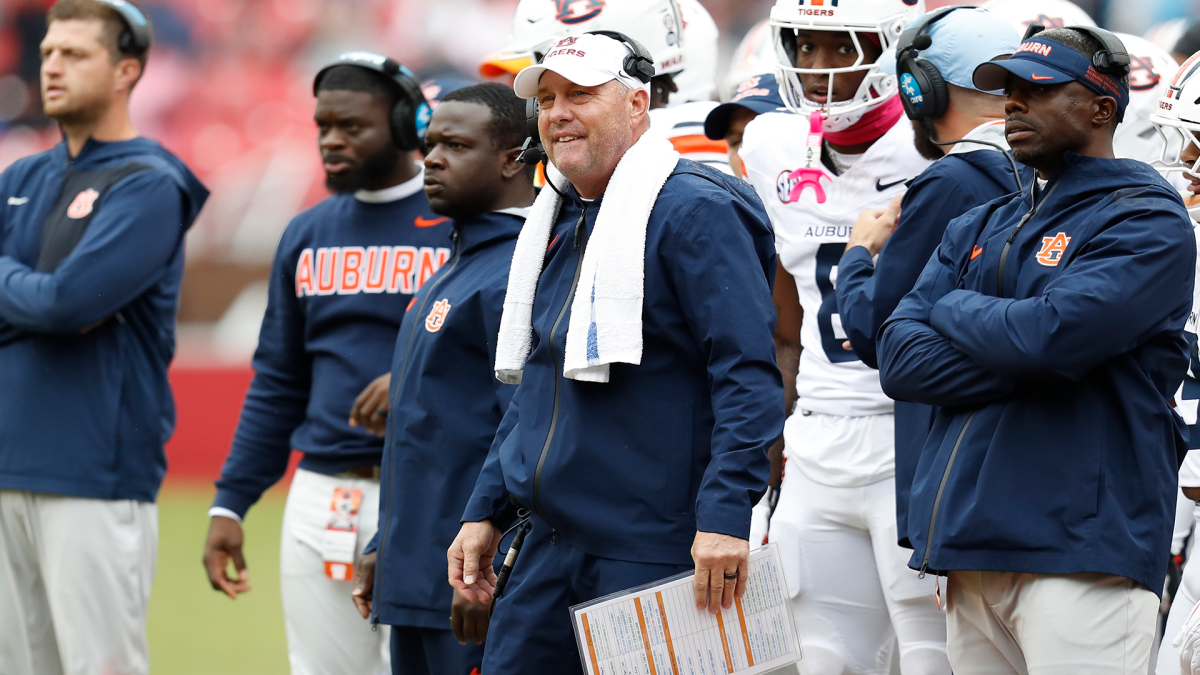Copyright CBS Sports

Every athletic director keeps a short list of names they'd call if their football coach suddenly walks out or flames out. On Sunday, those lists got scrambled when LSU fired Brian Kelly midway through his fourth season, igniting a market disruption on an already-volatile coaching carousel. Suddenly, schools that may soon enter the market must reassess their plans. Florida State's Mike Norvell has dropped four straight, prompting athletic director Michael Alford to issue the dreaded "vote of confidence" last week, pledging full support while promising a "comprehensive assessment" after the season. At Auburn, Hugh Freeze is 1-4 in the SEC in his third year. He publicly asked his boss for a vote of confidence last week and didn't get one, even after a road win against Arkansas. For both schools, the question isn't whether the seat is hot -- it's whether they can afford to pull the trigger now that another big school like LSU has entered the market within their geographic footprint. A record-breaking carousel season -- with eight power conference jobs already open -- includes blue bloods like Florida, LSU and Penn State, and more mid-tier power players will be in play. Will schools like Auburn, FSU hesitate on firings? CBS Sports spoke with industry leaders about how the developments at LSU could affect those decisions. "I feel like it shouldn't affect those decisions, but I think it will," a Big Ten athletics director told CBS Sports. "The demand for high-quality coaches that will provide hope to a fan base is greater than the supply as a result of all of the openings. I would want to know what my next step is before jumping in this pool." College football coaching carousel tracker: Grades, analysis on coach changes, 2025-26 firings and hirings Brandon Marcello Twelve FBS programs are now actively seeking a new head coach (the most ever in the middle of a season), and that number is expected to skyrocket by early December, further complicating a market already experiencing record-breaking disruption. Several schools will target the same coaches, creating an awkward carousel season that could yield more first downs than touchdowns. Kiffin can't coach five schools like Ole Miss, Florida, LSU, Auburn and Florida State simultaneously. Nor can hot candidates like Tulane's Jon Sumrall or Missouri's Eli Drinkwitz. All figure to at least be on the lists at those schools. "Some places may have a little bit more patience than others, but others, if they really feel like this is not the person for them, then they need to act," a power conference athletics director said. "That's a very unique local flavor type of thing." For big-time executives and boosters in this new era of big spending, they're weighing two clashing idioms from different eras: "All politics is local" and "scared money don't make money." Auburn and FSU are no strangers to spending big on the coaching carousel, but the weight of those failures at some point can strain -- or break -- the bank. Florida State recently poured $403 million into facility upgrades, including a renovated Doak Campbell Stadium. Firing Norvell would cost nearly $59 million, the second-largest buyout in college football history. Auburn's tab would be $15.4 million, giving the Tigers a hat trick of top-15 buyouts after paying Gus Malzahn and Bryan Harsin a combined $36.7 million. Fiscal responsibility? Not exactly. But in this market, money follows panic. Fiscal responsibility likely falls second to the likelihood that a school will compete with another well-resourced university for the same candidates. Revenue-sharing with players -- as much as $20.5 million annually -- has further squeezed athletic budgets. Even Norvell diverted $4.5 million of his $10 million salary this year to help FSU's finances after a disastrous 2-10 record in 2024. "It's fun to speculate about how industry moves impact other decisions, but at the end of the day, individual administrations make the best decision they can for the betterment of their institutions," a prominent agent told CBS Sports. "Administrations don't look at what is happening anywhere but in their stands and their bank statements." Even if a program swings big, the timing is brutal. Luring a playoff-bound coach like Kiffin could sabotage an entire recruiting season. The early signing period runs Dec. 3 through Dec. 5, and the new single-window transfer portal is set for Jan. 2 through Jan. 16. The playoffs run through mid-January. And there's no guarantee that a target like Kiffin -- or any successful coach -- will leave. Auburn learned that lesson in 2022 when it courted Kiffin aggressively, only for him to stay put at Ole Miss where he now has the Rebels on the brink of their first playoff berth. "Agents have a lot of different ways of making everybody feel secure or insecure, whatever the circumstance may be," a power conference athletics director said. "You'd need to have some type of very solid assurance that that's going to happen at the end of the year and figure out what makes both parties comfortable." Texas A&M's success with second-year coach Mike Elko only adds fuel. The Aggies are 8-0 for the first time since 1992 after firing Jimbo Fisher and eating a $76.8 million buyout, the largest in college sports history. Even Kiffin, the man at the center of the rumor mill, finds it all a bit unreasonable. "Elko doing such a great job at A&M puts in people's heads like, hey, these buyouts are ridiculous to pay, but I'm sure A&M right now is sitting there going, 'OK, well, yeah, that was ridiculous to pay, but we feel pretty good about that right now,'" Kiffin said this week. "So anytime something works, other people go, 'Well, let's go do that.' I think that's happened and it now has places accepting to pay these buyouts -- which I think is ridiculous, but (now) that it's happening, then it's easier for the next team and the next team to do it." The Buyout Bubble: Why college football keeps paying millions to make coaches disappear Brandon Marcello Combined buyouts for the 10 coaches fired this season have ballooned to a record $169.4 million, according to CBS Sports research. Whether those numbers rise substantially in November and December depends not just on wins and losses. Changes at places like LSU and FSU mean committing more than $100 million to pay off the outgoing head coach and staff to bring in a new coach and staff. Whether LSU's decision to enter the coaching market deters or spurs others will be fascinating. A record-breaking job market will be inundated with hopes and dreams, but likely more misfires than hits. Only four power conference coaches were fired last season. Eight jobs are currently open, the most since 2022. NC State athletic director Boo Corrigan put it bluntly earlier this month: "Honestly, I think there's been a little bit of a loss of dignity in what we do and firing of coaches mid-season. You've got people that truly dedicate their life to something, and if it doesn't work out, is there a need to fire them immediately? Can you look at it and say, 'All right. What do we owe back? Are the young people buying into the coach? Are they playing hard? Do they still care about each other? Do those things matter or is it just wins and losses?'" As schools chase instant results, the price of failure keeps climbing. And LSU's bold move might inspire others or scare them straight.



